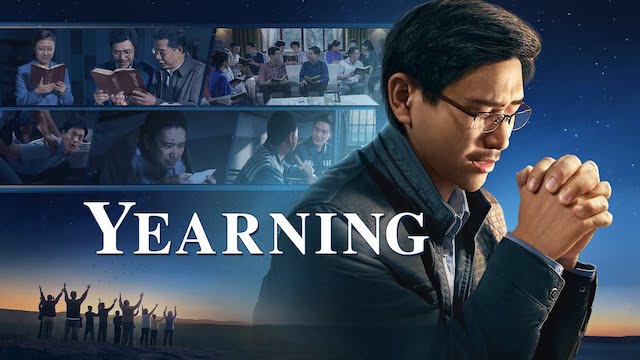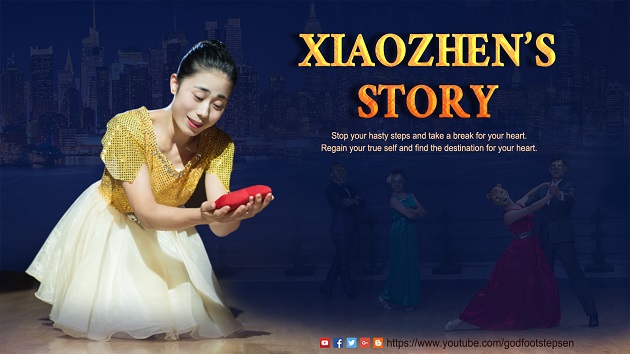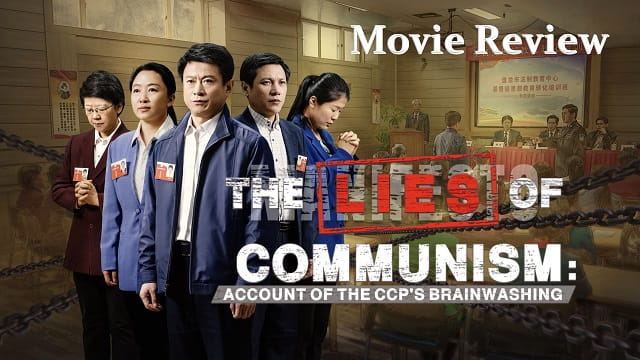Review of Xiaozhen's Story: The Soliloquy to Life
Movie fans are no stranger to soliloquy. It is a speech in which a character reveals his or her inner feeling, and also a vehicle for revealing the character’s thoughts and character and offering insight into the character’s interior world. Wong Kar-wai, a Hong Kong renowned director, for instance, is dexterous in using soliloquy in his features. Soliloquy, through offering insight into the character’s inner world, creates a bridge between the audience and the character, and allows the audience to have a deep understanding of the plot as well as the thoughts and feelings of the character.
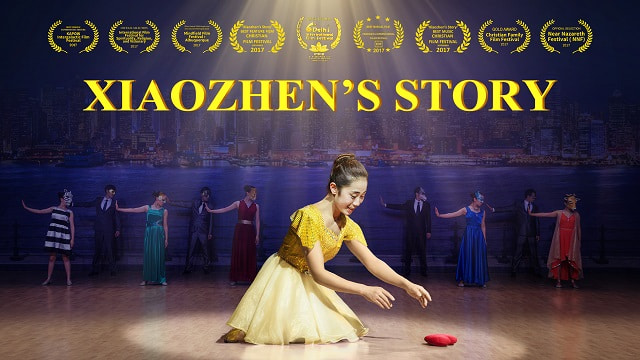
Recently, I watched a musical Xiaozhen's Story, which is a story about betrayal, degeneration, and life transformation. Christian Xiaozhen finds a piece of gold by chance, which, in the musical, represents many things, such as money, fame, status, and opportunity, etc. When Xiaozhen shares the gold with her friends out of a true heart, she unexpectedly suffers their betrayal. Because of the gold, old friends come to blows and turn against each other. After a bitter fight, they carve up the gold, give Xiaozhen a sound thrashing, and swagger off.
Apart from the catching music and dance, the soliloquies of the heroine are also classic. They contain the thought, doubt, and exploration of human life, thread the heroine’s whole life, make the character of Xiaozhen penetrate deeply into the audience’s heart, and provoke the thinking of life.
Here are some appreciations of Xiaozhen’s soliloquies.
Soliloquy (1): For so many years, I’ve treated my friends and people around me with a true heart. I just want to be a good person. Be a good person! I gave my true heart to the world, to all the people around me. I never expected … I never expected I would end up like this. Was I really wrong? Was I wrong? Was I wrong?
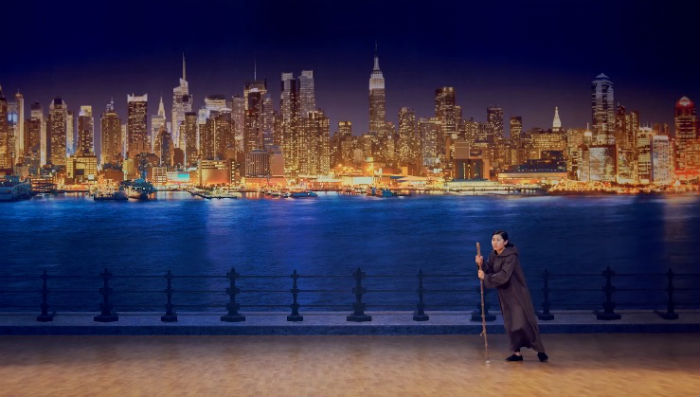
Many years later, Xiaozhen, living in the lowest depths of society, labors along in a cold breeze with a stick. Her shabby dress is a sharp contrast to the brilliant city-night, which shows her poor life and humble condition. The erhu accompaniment adds to the melancholy of the musical.
Unlike her friends who are mercenary and selfish, Xiaozhen is a kind and simple girl. She wants to be a good person, but she is so ignorant that she stubbornly gives her true heart to this evil world. In her opinion, treating friends and people around her with a true heart is the criterion of a good person. However, when she acts according to this criterion, she is buffeted by her friends’ betrayal. The cruel reality throws her for a loss: Why do good people have no good rewards in this world? Why is it so hard to be a good person? Am I wrong?
Soliloquy (2): It was so close! If Datou’s knife really came down on me, I would be dead now. It’s so dangerous to be around them. Wait! What’s wrong with me? How could I be so scared to die? (sigh) There’s no shame in being scared to die. Being alive is already dangerous. These people are horrible. They’re malicious. Why didn’t I realize that? If I stay with them, I’m risking my life. But I have to survive. All of them have some gold. They’re rich now. (sigh) Maybe if I stay close to them, some wealth will rub off on me. That’s a good idea, right? Or! I could … No, I couldn’t, I couldn’t … What about if I try to live like them? (sigh) I have to live on.
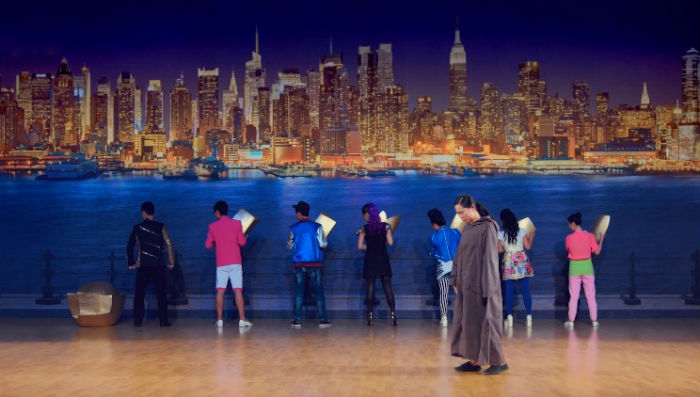
This soliloquy reveals the battle within Xiaozhen as well as the change in her ideas and viewpoints. In order to live on, she flounders for a fresh start, trying to become a part of her friends. After Xiaozhen joins her friends, their pace, accompanied by the fast music, is getting faster and faster, and the seesaw battle between them becomes more and more fierce, which implies the continual degeneration of man. A shriek of laughter blended into the score is a typical embodiment of black humor, also the satire on the modern society.
Since her true heart is repaid with her friends’ betrayal, Xiaozhen tries to get justice from them but receives a threat of violence from the villain and nearly loses her life. From then on, a war starts in Xiaozhen’s heart, and she feels perplexed and hesitant. Though she clearly knows that it’s so dangerous to be around those people, she still follows them unswervingly and tries many means to fit into this evil world. Why? The word “I have to live on” is answer enough. This word of self-consolation sounds very reasonable, for if we refuse to fit into the society we will be eliminated. In order to survive, we have no choice but to make compromise and adapt to the evil trends. Though we thirst for the light from the depth of our hearts, how can us humans, so weak, withstand the temptation of money, fame, and status? The word “I just want to live on” carries a feeling of resignation and sadness and sounds so pathetic. In front of money, fame, and status, we are so powerless, and as a result, we gradually lose ourselves. Generation after generation of people repeat this tragedy.
Soliloquy (3): My heart is sincere … My heart is sincere … Actually, I just want to live on. I just want to live on. I just want to live on! Is it wrong? But the world’s hand clutches at my throat! What hope do I have left in life?
I really like this soliloquy. Although the lines are not too many, they successfully convey the hopelessness in Xiaozhen’s heart. Besides, the performance of the actress is so electrifying and powerful. Whether it is muttering, questioning, or accusing, she fully expresses Xiaozhen’s grievances, confusion, and anger, as well as her dissatisfaction with this world. All her suffering is conveyed by the word “Forget it.” Having no choice, she makes the painful decision to take out her heart, shouting desperately, “My heart … My heart … My true heart has been destroyed by the world! Destroyed!” And then she tears at her “true heart,” throws it away, and bursts into wails. The smooth performance coupled with fast-tempo strings creates a suffocating despair.
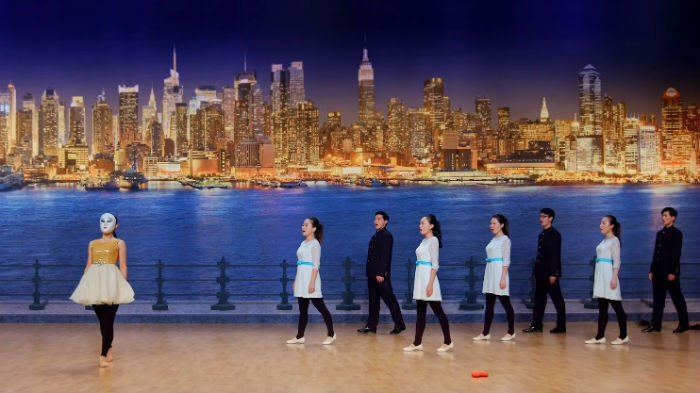
The actress vividly presents the struggle in Xiaozhen’s heart through her rich expressions and body language, which makes the figure more real and three-dimensional. When taking her “true heart” in her hands, she looks relieved and peaceful and the score is quite and gentle. When putting aside her “true heart,” she is painful like a mother tearing herself away from her child. Hesitating between the “true heart” and the mask, she falls into a miserable struggle. The scene wrenches at my heart and I wish she can choose the “true heart” and be herself. However, she finally wears the mask for her living. While sighing for Xiaozhen, I couldn’t help thinking: Will we make the same choice if we are in the same spot like her? Will we be against our conscience to adapt to the evil trend for money, fame, and status, and live with a mask?
Soliloquy (4): I gave my true heart to the world, to all that I love and adore, and in return I lived well as neither a man nor a beast! My heart is broken … Heaven! Save me! Why is this world so evil? Where is the light? Where is righteousness?
The end of man is the beginning of God. After the dancing party, Xiaozhen is worn out and sinks to the ground. Then, a gentle singing sounds on the stage and arouses her. Along with the song, she remembers God and begins to call on Him and seek Him, only to find nothing. Helpless and fearful, she is just like a lost girl. Her indictment of this evil world reveals the distress and helplessness in her heart, which strikes to the heart of the audience, for she not only speaks for herself but also voices the mind of everyone.
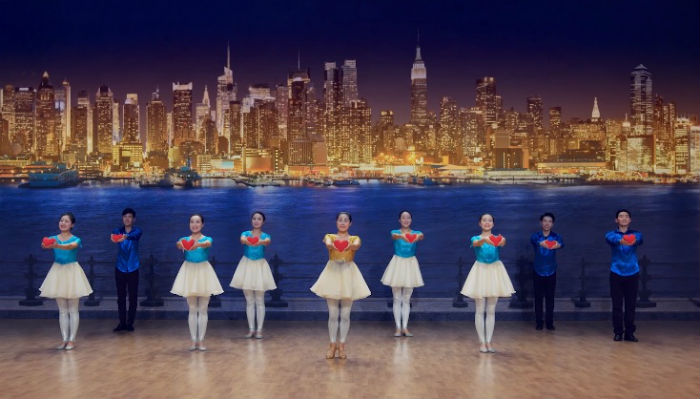
When the singers, wearing masks, slowly walk on stage and struggle to tear off their masks, the scene is really so heartshaking. As all of the actors on stage are calling on God and singing hymns to praise God with “true hearts” in their hands, the musical works up to a climax.
Living in this world, we only feel life is full of suffering but have no way out; we, though trying to be a good person, involuntarily go against our conscience and lead a life devoid of direction and a sense of purpose. Why? I believe The Story About Xiaozhen has told us the answer—it is all because we haven’t come before God or known His will. Therefore, only when we free ourselves from the influence of Satan and return to the presence of God, can we no longer be afflicted by Satan. In fact, God only asks that man be true, just as the theme song goes: “He is watching by your side, waiting for you to turn back. He is waiting for the day your memory suddenly recovers: becoming conscious of the fact that you came from God, somehow and somewhere once lost, falling unconscious on the roadside, and then, unknowingly having a father. You further realize that the Almighty has been watching there, awaiting your return all along. He longs bitterly, waiting for a response without an answer. His watching is priceless and is for the heart and the spirit of humans. Perhaps this watching is indefinite, and perhaps this watching is at its end. But you should know exactly where your heart and spirit are now.”
Xiaozhen's Story Trailer:
Watch Full Video: Xiaozhen's Story


